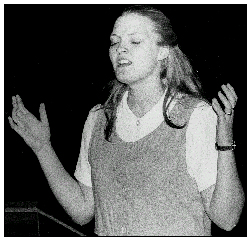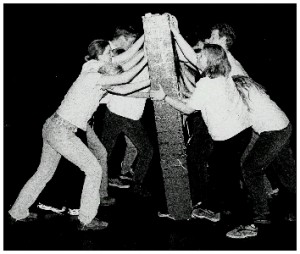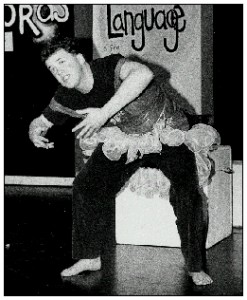 After a few years when locally written scripts had virtually disappeared from the UCCB Dramagroup’s One Act Play Festival, this year original works arrived back onstage with a vengeance. Of the seventeen works performed, eight were new pieces that made their debut at the Boardmore Playhouse and would have filled four complete evenings of theatre going if run together. This is an encouraging sign that an event that had nurtured the early writing efforts of Bryden MacDonald, Audrey Butler (who both had plays nominated for the Governor General’s Award), Ed Macdonald (who was a creative mainstay of the Summertime Revue and This Hour Has 22 Minutes) and Duncan Wells (songwriter and award winning children’s entertainer), still provides access to an audience for a new generation of young writers, as well as a training ground for actors, directors and technicians.
After a few years when locally written scripts had virtually disappeared from the UCCB Dramagroup’s One Act Play Festival, this year original works arrived back onstage with a vengeance. Of the seventeen works performed, eight were new pieces that made their debut at the Boardmore Playhouse and would have filled four complete evenings of theatre going if run together. This is an encouraging sign that an event that had nurtured the early writing efforts of Bryden MacDonald, Audrey Butler (who both had plays nominated for the Governor General’s Award), Ed Macdonald (who was a creative mainstay of the Summertime Revue and This Hour Has 22 Minutes) and Duncan Wells (songwriter and award winning children’s entertainer), still provides access to an audience for a new generation of young writers, as well as a training ground for actors, directors and technicians.
 This year’s One Act Festival also distinguished itself by the consistent quality of all of the productions. Every play, whether serious drama or entertaining comedy, hit its mark with style and precision – a feat that in previous years, despite the best efforts of those involved, was not always achieved.
This year’s One Act Festival also distinguished itself by the consistent quality of all of the productions. Every play, whether serious drama or entertaining comedy, hit its mark with style and precision – a feat that in previous years, despite the best efforts of those involved, was not always achieved.
Of the original scripts, a notable feature was the variety of material presented. Aaron Corbett’s Love Is Hard To Find and The Writing Of A Play by Keith Morrison (presented together on the same night) each featured an omniscient narrator who interfered directly with the action onstage. But whereas Corbett’s play elicited big juicy laughs from the audience by demonstrating that true love is a chancy proposition even with the divine intervention of the gods, Morrison hilariously parodied the time-tested premise of the struggling writer at the end of his creative rope.
David Wayne McKay, who directed last fall’s epic production of Sartre’s The Flies, wrote and directed three monologues based on the lives of significant characters from Cape Breton’s history. The two shorter pieces, presented together, featured, respectively, Guglielmo Marconi, father of the radio, and Dawn Fraser, the Glace Bay poet and rabble-rouser. Both featured strong, assured performances by Robin McKittrick as Marconi and Keith Morrison as Fraser, but my personal preference was for Fraser, who in his poetry combined three very Cape Breton traits – anger at the social injustice around him and a devastating satirical wit and a bottomless compassion for the people living under an oppressive economy. It’s surprising how much of Fraser’s work, especially a piece on politics written in the 1920’s and included in the monologues, is still relevant to Cape Breton today. McKay’s third monologue, an extended piece on the life of boxer Jack Munroe, was halted early in its performance when a cast member was overtaken by illness on stage. McKay’s writing (and his direction) had an admirable clarity, flow and sense of character that served his subjects and his audience extremely well.
 In contrast to McKay’s historical subjects, The Four Marys, by this reviewer, was a completely fictional piece about a young woman who rebelled against her privileged but emotionally dysfunctional family by becoming a drug abusing petty criminal only to have her life take an abrupt left turn when she goes through a religious experience and joins a religious order working in a war-torn developing country. Yes, that is a lot of ground for one person to cover, but Liz Martin as the young woman gave an uninterrupted 40 minute performance full of passion, humour and insight and she fully deserved the standing ovation at her curtain. And so says me, the writer and director.
In contrast to McKay’s historical subjects, The Four Marys, by this reviewer, was a completely fictional piece about a young woman who rebelled against her privileged but emotionally dysfunctional family by becoming a drug abusing petty criminal only to have her life take an abrupt left turn when she goes through a religious experience and joins a religious order working in a war-torn developing country. Yes, that is a lot of ground for one person to cover, but Liz Martin as the young woman gave an uninterrupted 40 minute performance full of passion, humour and insight and she fully deserved the standing ovation at her curtain. And so says me, the writer and director.
Bricks and Martyrs, intelligently written and directed by Kate O’Neill, explored social issues in the guise of a modern Pilgrim’s Progress-like morality play as Slander, Greed and Uncaring work their evil on a deceived humanity until Kindness, Integrity and Honesty are literally walled off and pushed off the face of the earth leaving only tiny angelic Hope. This play was a highlight of the festival, both for its concept and execution. My only criticism being that the bad trio were so obviously heavy handedly evil, the audience might have been more thoroughly convinced if they could have seen how evil charms the worst of normally good people.
Virtual Flip, a collective piece by the Contents Unknown theatre group, had everything – wild comedy, satiric songs, energetic dance pieces and a serious monologue boosted by a large enthusiastic cast directed by two formidable talents, John LeBlanc and Maura Lea Morykot (typecast in Bricks And Martyrs as Greed and Slander, respectively). But there may have been too much and some judicious editing might have strengthened a good show.
Of the previously published plays performed during the festival, the choice of material was equally eclectic. John Lingard, using his students from his English 309 course, directed six works: two comedic sketches by Harold Pinter – James Donovan gave a hilariously physical performance as The Applicant and John LeBlanc, as a porn merchant, bemoaned the negative effect Christmas has on his business. A Peculiar Position a clever and tightly scripted farce by Eugene Scribe, boasted a very funny turn by Mike Sidney as the egomaniacal Champignon. A Talk In The Park and Drinking Companion by the great British playwright Alan Ayckbourn featured excellent performances; in the first play by a five person cast as characters who want to be heard but don’t want to hear other people and in the second play a tipsy businessman (James Donovan) tries to seduce a perfume demonstrator (Sarah Blanchard) and her reluctant friend (Krista MacDonald). Linda Her by Harry Kondoleon featured an affecting performance by Chiyo Shimizu as a woman whose mid life ennui prompts her to leave her family in the care of her puzzled best friend and hit the road. Lingard in all six plays showed his talent guiding new actors through challenging material.
 Another director with a knack for eliciting strong performances from young actors is Brian Gallivan. His contribution this year was Lepers, about a trio of young women who because they cannot conform to society’s norms are ostracized as lepers. Although the play bore some passing thematic and dramatic resemblance to To Burn A Witch, one of Gallivan’s previous efforts, Gallivan demonstrated a more sure and nuanced hand with the character relationships among his young cast (Colleen MacIsaac, Danielle McKinnon, Melanie Pronko, Jade Bennett and Alison MacDougall were all excellent).
Another director with a knack for eliciting strong performances from young actors is Brian Gallivan. His contribution this year was Lepers, about a trio of young women who because they cannot conform to society’s norms are ostracized as lepers. Although the play bore some passing thematic and dramatic resemblance to To Burn A Witch, one of Gallivan’s previous efforts, Gallivan demonstrated a more sure and nuanced hand with the character relationships among his young cast (Colleen MacIsaac, Danielle McKinnon, Melanie Pronko, Jade Bennett and Alison MacDougall were all excellent).
Harry Boardmore, who with Liz Boardmore founded the Dramagroup and the play festival, returned with All In The Timing, six one act comedies by American writer David Ives. Rather than plays, I found Ives’ work to more like really smart skit writing as evidenced by the premise driven nature of the work: a young man and a young woman get multiple chances to iron out the romantic faux pas in their first encounter; three chimps in a lab agonize over their task of spontaneously typing out Hamlet when they don’t know what a “Hamlet” is; a shy woman finds her self-confidence while trying to learn a gibberishly “universal language” from a con man; the city of Philadelphia’s surreal spirit curses a man’s life; an exiled Leon Trotsky gamely copes with an assassin’s icepick in his skull for a day and a half; and David Mamet’s sexually perverse plays are speedily buffaloed. But while Ives’s plays are cleverly written and consistently funny, compared to Ayckbourn’s one acts, Ives plays lack a certain depth. Some may like plays about words, I like plays about people. And the five people in the cast made the show. Robb Hartlin, Amy Kokoszka, Laurel MacDonald, Robin McKittric and Kelly Peck all gave a wide variety of flawless performances and perfectly clicked as a working ensemble. Boardmore used them and their material to its best advantage.
One of the first serious plays I ever saw was Red Cross by Sam Shepard, performed at the Lyceum and directed by Harry Boardmore. A new production, directed by Robin McKittrick was one of the standout works of this years festival. To say that a married hypochondriac and a housekeeper at a health resort discover an affinity for each does not scratch the surface of this complex and disturbing play. On a bone white set, in bone white costumes, the cast and director caught the icy cadence of Shepherd’s dialogue, which manages to be comfortably familiar and menacingly alien at the same time. Keith Morrison, as Jim, and Heather Pyke, as the Maid, both gave haunting performances with able support from Karen Peters as Carol, Jim’s wife. With seventeen plays, some with large casts, I apologize not having the space to mention everyone who deserves mention. All I can say, everyone deserves to be congratulated on producing one of the strongest and most original One Act Festivals for many years.
 Brian Gallivan also brought two magical one-acts to the stage in April with Once Upon A Summertime by Mary S. Schaller and The Magician’s Nephew an adaptation of C.S.Lewis’ second Narnia book by Aurand Harris. Both plays demonstrated Gallivan’s gift for choosing plays that explored challenging ideas for young audiences and with solid stories to keep the older folks interested as well. In “Summertime”, Tiffany is a young girl coping with the recent loss of her vision who finds a comforting friendship with Robin. What Tiffany doesn’t know is that Robin is a goblin living in the forest cursed by the Fairie King to lose the thing he loves most. Although wary at first, Robin eventually grows to love the lonely girl but sacrifices himself to save her.
Brian Gallivan also brought two magical one-acts to the stage in April with Once Upon A Summertime by Mary S. Schaller and The Magician’s Nephew an adaptation of C.S.Lewis’ second Narnia book by Aurand Harris. Both plays demonstrated Gallivan’s gift for choosing plays that explored challenging ideas for young audiences and with solid stories to keep the older folks interested as well. In “Summertime”, Tiffany is a young girl coping with the recent loss of her vision who finds a comforting friendship with Robin. What Tiffany doesn’t know is that Robin is a goblin living in the forest cursed by the Fairie King to lose the thing he loves most. Although wary at first, Robin eventually grows to love the lonely girl but sacrifices himself to save her.
Stephen Arbuckle, as Robin, gave a charmingly physical performance that hit the right mix of Shakespearean Puck and Peter Pan. Lindsay King, as Tiffany, was natural and believable and she and Arbuckle worked well off each other.
The Magician’s Nephew is actually a prequel to last year’s production of The Lion, The Witch and The Wardrobe, also directed by Brian Gallivan. In late Victorian London, Uncle Andrew is up in the attic making powerful magic rings even though he’s barely competent enough to be doing card tricks in the parlour. The fubsy magician’s nephew, the adventurous Digory and his friend Polly stumble on his uncle’s creations and are accidentally whirled off into other magical lands and eventually and inadvertently bring the evil Queen Jaddis to the paradisical land of Narnia, where only the great lion Aslan has the courage and wisdom to help Rigory defeat Jaddis’ wickedness. This story, like the other Narnia stories, is a fairie tale reworking of many of the elements of Christian belief to make them comprehensible to the young mind, and on that level they work beautifully as well as being ripping yarns.
The very talented Joseph O’Toole, as Digory, gave another in a series of polished and charming performances. As Polly, Terry MacKinnon had all the pluck and level-headedness of the typical Victorian heroine. John Bedford, as Uncle Andrew, was full of comic bluster, even perhaps too full since he started big and got bigger and might have benefited from modulation in his delivery. Florence Chant gave welcome support as crotchety Aunt Letty. The impressively voiced Greg Finney brought an appropriate majesty to Aslan that caught the divine qualities of the great lion. A surprise treat was the wicked fun that Laurel MacDonald, who usually plays the sweet-faced ingenue, had as the really really mean Queen Jaddis. Her performance here along with her work in All In The Timing should open up a wide range of roles for this talented actor and choreographer.
These two very different plays benefited from two very different directing strategies. In Summertime Gallivan with very limited stage space available, kept Tiffany rooted to one spot as Robin sprightly bounded around her. This emphasized Tiffany’s shyness and vulnerability in contrast to Robin’s boldness and elusiveness. The Magician’s Nephew benefited from a large revolving set piece and a chorus of colourfully costumed critters of Narnia. With more space to work with and more spectacle to lovingly create, Gallivan could work more effectively on pacing and action/ Gallivan also chose the best for his technical crew who all delivered top quality work: Lillian Sparling (costume design); Anndelynn Barter (make-up design); Ingrid Bjornson (set design); Ken Heaton (lighting design); Melanie Pronko (choreography); and the irreplaceable Ida Steeves (stage manager).
Another delightful production for children was Chocolate Fever, a musical written and directed by Suzanne Colford, adapted from the book by Robert Kimmel Smith and presented at Colby School by the Highland Kids Musical Drama Company and the Colby School Choir. It told the tale of poor Henry Green, the boy who ate so much chocolate he broke out in chocolate spots. Scorned at school as a freak and prodded by doctors as a medical curiosity, much to the alarm of his worried family, Henry runs away until the wise Miss Sugar Cane helps him to cope with his predicament.
Wesley Colford was sweet and charming Henry and, for grown-ups, Laura Conrod and Michael Morrison gave good work as well. The rest of the large cast gave enthusiastic and fun performances.
Ms. Colford’s adaptation was funny and cleverly written and her original songs were superb with snappy memorable melodies that kids and adults could enjoy. Cathy MacNeil led the wondrously voiced student choir through some intricate arrangements. All the proceeds from “Chocolate Fever” will be used to refurbish the Colby School performing space which is good since, even with the group’s best efforts to work the space into shape, the room couldn’t match the high quality of their play and their performances.
Best of luck to the troupe of actors, the UCCB Dramagroup is sending to The Medieval Theatre Festival being held at the University of Toronto in early summer. Along with groups from around the world, the UCCB group will perform two selections (The Annunciation and The Visitation) from the forty-seven plays of the York Cycle of biblical dramatizations. The plays will be performed on carts that will be moved from performing area to performing area on a circuit around U of T as they used to do in ye olde dayes. Travelling to Toronto will be Krista MacDonald, Sarah Blanchard, Richie Wilcox and Boardmore Playhouse manager Todd Hiscock (who just arrived home from a year theatre study at York University in Toronto). The plays will be directed by John Lingard.
Until next time, fare thee well.

